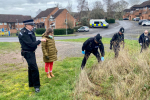
Rachel has helped to secure a raft of new measures to tackle spiking.
The new package will see changes to the legislation, research into self-testing kits, more training for door staff and better education for young people, to raise awareness about the threat. There will also be coordinated police action to crackdown on spiking during key weeks of the year – an approach that has proved successful in tackling other crimes, such as knife crime.
The step up to tackle spiking comes as the government prepares to clarify under the Criminal Justice Bill, that without any doubt, spiking is illegal. It will be backed with separate guidance, set in law, to provide a clear, unequivocal definition of what spiking is. This will give victims renewed confidence to come forward, increase public awareness of the crime and enforce that perpetrators will face up to 10 years behind bars.
Alongside this, the Government will set out practical measures aimed at improving understanding of the crime and delivering better support to victims. This includes:
- training hundreds more door staff to spot potential perpetrators and signs patrons have been victimised
- investing in research into spiking testing kits to help venues and police detect if someone’s drink has been spiked in real-time
- intensive operations run by the National Police Chiefs Council (NPCC) to tackle spiking during key weeks across the 43 police forces in England and Wales
- an online spiking tool to be rolled out to all police forces to make it easier to anonymously report it if people fear they have been a victim of the crime
- updated statutory guidance to include spiking (s182 Licensing Act 2003)
- a spiking guidance/advice toolkit for the public that contains a range of resources and signposting for anyone who is looking for information on spiking, what it is, who is affected, how to report it, how to support victims, and which criminal offences can be used to prosecute it
- supporting the higher education regulator, the Office for Students, as they take action to make sure universities and other higher education institutions to prevent and address sexual misconduct – this will follow its consultation on the issue, expected to report back in early 2024
Rachel started the Government’s work on this issue during her time as Minister for Safeguarding in the Home Office.
She continued to make the case for tougher action to tackle spiking from the backbenches by working with MPs to secure the package of measures announced by the Government.
Rachel said:
“I was the responsible Minister in the Home Office when spiking by needle first came to light and we worked extensively to understand and analyse this new and disturbing phenomenon because it was mainly young women - and lots of students at their freshers week - who were affected.
“It was dismissed by some experts as hysteria, but I was determined we should tackle it because as a parent of a daughter who had been to university I know how worrying and disorienting that time away from home could be.
“Ever since then the Government has been committed to acting to keep women and girls safe, and after listening to countless victim testimonies, I also came to the conclusion we needed stronger action.
“Spiking can occur by needle and by drink and it is often underreported or dismissed. Victims felt ignored and did not know where to go - and often they were blamed for going out and getting drunk or irresponsible behaviour. To me this was wrong. As a young woman I had my own fair share of behaving irresponsibly - it’s part of growing up and I wouldn’t want to take that away from any young person.
“The new measures announced by the Government will help to tackle spiking wherever it occurs and give victims confidence that their reports will be taken seriously, and action will be taken. It’s important that testing lab capacity exists to process samples to enable a prosecution case to be built. Altogether this will be a significant step in tackling this frightening and dangerous criminal behaviour.”





